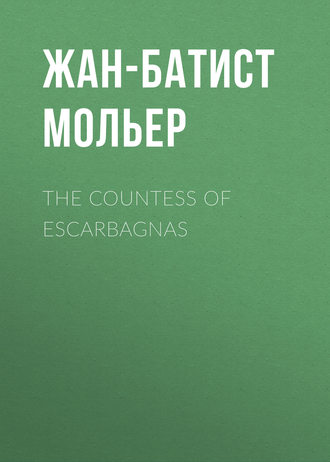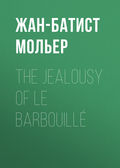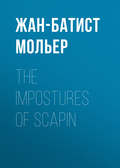
Мольер (Жан-Батист Поклен)
The Countess of Escarbagnas
Visc. No, it is enough that I have repeated them to you, and I ought to stop there. A man may be foolish enough to make verses, but that is different from giving them to others.
Ju. It is in vain for you to affect a false modesty; your wit is well known, and I do not see why you should hide what you write.
Visc. Ah! we must tread here with the greatest circumspection. It is a dangerous thing to set up for a wit. There is inherent to it a certain touch of absurdity which is catching, and we should be warned by the example of some of our friends.
Ju. Nonsense, Cléante; I see that, in spite of all you say, you are longing to give me your verses; and I feel sure that you would be very unhappy if I pretended not to care for them.
Visc. I unhappy? Oh! dear no, I am not so much of a poet for you to think that I … but here is the Countess of Escarbagnas; I'll go by this door, so as not to meet her, and will see that everything is got ready for the play I have promised you.
SCENE II. – THE COUNTESS, JULIA;
ANDRÉE and CRIQUET in the background
Coun. What, Madam, are you alone? Ah! what a shame! All alone! I thought my people had told me that the Viscount was here.
Ju. It is true that he came, but it was sufficient for him to know that you were not at home; he would not stop after that.
Coun. What! did he see you?
Ju. Yes.
Coun. And did he not stop to talk with you?
Ju. No, Madam; he wished to show you how very much he is struck by your charms.
Coun. Still, I shall call him to account for that. However much any one may be in love with me, I wish them to pay to our sex the homage that is due to it. I am not one of those unjust women who approve of the rudeness their lovers display towards other fair ones.
Ju. You must in no way be surprised at his conduct. The love he has for you shows itself in all his actions, and prevents him from caring for anybody but you.
Coun. I know that I can give rise to a strong passion; I have for that enough of beauty, youth, and rank, thank Heaven; but it is no reason why those who love me should not keep within the bounds of propriety towards others. (Seeing CRIQUET.) What are you doing there, little page? is there not an ante-room for you to be in until you are called? It is a strange thing that in the provinces we cannot meet with a servant who knows his place! To whom do you think I am speaking? Why do you not move? Will you go outside, little knave that you are!
SCENE III. – THE COUNTESS, JULIA, ANDRÉE
Coun. Come hither, girl.
And. What do you wish me to do, Ma'am?
Coun. To take off my head-dress. Gently, you awkward girl: how roughly you touch my head with your heavy hands!
And. I do it as gently as I can, Ma'am.
Coun. No doubt; but what you call gently is very rough treatment for my head. You have almost put my neck out of joint. Now, take also this muff; go and put it with the rest into the closet; don't leave anything about. Well! where is she going to now? What is the stupid girl doing?
And. I am going to take this into the closet, as you told me, Ma'am.
Coun. Ah! heavens! (To JULIA) Pray, excuse her rudeness, Madam. (To ANDRÉE) I told you my closet, great ass; that is the place where I keep my dresses.
And. Please, Ma'am, is a cupboard called a closet at court?
Coun. Yes, dunce; it is thus that a place where clothes are kept is called.
And. I will remember it, Ma'am, as well as the word furniture warehouse for your attic.
SCENE IV. – THE COUNTESS, JULIA
Coun. What trouble it gives me to have to teach such simpletons.
Ju. I think them very fortunate to be under your discipline, Madam.
Coun. She is my nurse's daughter, whom I have made lady's-maid; the post is quite new to her, as yet.
Ju. It shows a generous soul, Madam, and it is glorious thus to form people.
Coun. Come, some seats, I say! Here, little page! little page! little page-boy! Truly, this is too bad not to have a page to give us chairs! My maids! my page! my page! my maids! Ho! somebody! I really think that they must be all dead, and that we shall have to find seats for ourselves.







